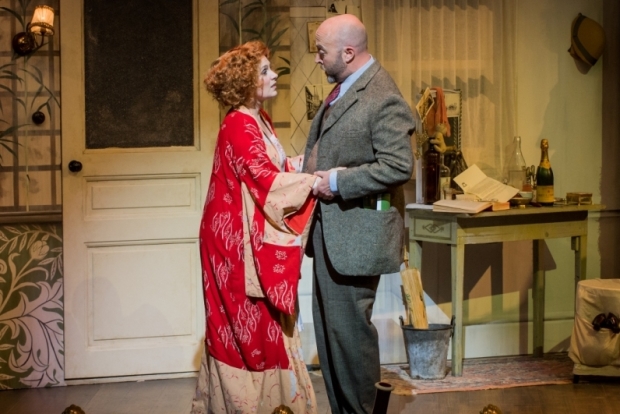Review: Zazà (Opera Holland Park)
Leoncavallo’s lush, darkly romantic opera in a rare showing by London’s Italian specialists

© Robert Workman
Most forgotten operas vanish for good reasons. Zazà, though, is the wonder that got away. Perhaps the lack of tragedy is to blame for its neglect, or the absence of comedy, or both. Opera audiences like a bit of red meat to chew on; but Leoncavallo, the man who gave us prime-cut Pagliacci, serves up champagne and petits fours in this tale of a music-hall singer who loves the wrong man.
Yet Zazà is desperately, wringingly human, an opera that threatens to go in one direction then folds in on itself. The tale of a passionate woman who discovers just in time that her lover is married with a young daughter, and who finds when she confronts him that he's deep-down unpleasant, has more of Verismo (Italian for 'true') than any standard stab-'n'-sob epic.
Director Marie Lambert treats the opera to a busy, larded production that's at its best when it trusts the material. Before the interval a choc-a-bloc wide stage – spectacularly filled in designs by Alyson Cummins that depict both onstage and backstage theatre worlds – threatens to overwhelm the human drama. Sit too close and you'll get a crick in your neck from trying to work out what's what or who's who. The second half, simpler and with a centre-stage focus, respects the opera's angst and is all the better for it.
The action is queasily meta-theatrical in places. Zazà's dressing room consists of five random flats slung together. There is a door, but it's pot luck whether anyone uses it. People are just as likely to nip in round the sides or through the wardrobe. And by way of a link to the very first Zazà, there is a closing flourish that nods at another role that Rosina Storchio created (and one in which soprano Anne Sophie Duprels has also triumphed), Madama Butterfly. It's a random moment that smacks of indulgence, but it makes a striking image.
'Full Italianate sumptuousness'
Duprels is one of today's great singing actresses who can take us to heaven or drag us to hell – most frequently the latter. She may be an Opera Holland Park regular, but in her case familiarity breeds admiration rather than anything else. The French soprano has a vocal warmth that's especially strong in the upper registers, and she's a charismatic company totem. Her Zazà is first an entitled, Arkadina-style theatre star (albeit in Saint-Étienne rather than among the bright lights), then an impassioned lover, and only finally a dignified woman who takes control of her emotions.
Tenor Joel Montero made heavy weather of her inamorato, Milio Dufresne, although that was as nothing beside the natural flash storm that accompanied the lovers' farewell on opening night. A well-timed pathetic fallacy chucked it down so hard the singers were scarcely audible.
Richard Burkhard, by contrast, was magnificent as Zazà's sympathetic ex-lover-turned-confidant, her co-star Cascart. His burnished baritone is an unsung national treasure. And a plethora of detailed cameos from the strong supporting ensemble ensured that the opera's chaotic public side had zip and swagger.
Thanks to the City of London Sinfonia, conducted into full Italianate sumptuousness by Peter Robinson, the score's proto-Hollywood flavour came through as persuasively as Leoncavallo's tense tenderness when Zazà encounters Milio's daughter, Totò (a delightful performance by young Aida Ippolito in this spoken role). What a scene that is! If the opera's opening flourish of four rising notes betokens high romance, its instant quietening thereafter suggests a corrective shot of realism. When it comes, the child is its catalyst.
Leoncavallo's gorgeous, passionate opera has all the ingredients for a summertime hit. There are just four more opportunities to make it so.
There are further performances of Zazà at Opera Holland Park on 20, 22, 27 and 29 July.












